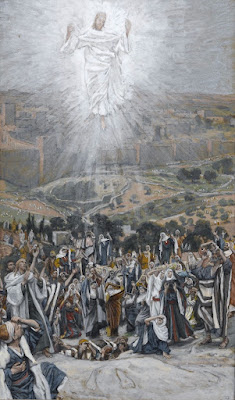Fr. Philip Neri Powell OP
St. Dominic/OLR, NOLA
Jesus, his disciples, and a huge crowd of random people who want to hear what Jesus has to say – they all find themselves in a deserted place. A place w/o food, water, shelter. Not much to recommend it for comfort or protection. The disciples suggest to Jesus that he send the people into the nearby villages for the night, so they can find a bed and something to eat. Jesus answers with an apparently less-than-helpful suggestion of his own: “Give them some food yourselves.” You can almost see and hear the disciples' aggravation and frustration. Here we go again! Another lesson in mystery. Another impractical exercise to show us up. Where are we going to get enough food for this many people? How would we get it to them even if we had it? They're perfectly capable of finding food for themselves! OK. Maybe that's what I'd be thinking. Maybe the disciples were a little more docile to the Lord's lessons. Regardless, the problem before them must've seemed insurmountable at the time. And it is. . .until Jesus intervenes and shows them the miraculous power of his blessing. In that deserted place, he shows them all the power of the Eucharist.
And what is this power? It's not the power to shame people into sharing the food they've squirreled away for themselves. It's not the power to say grace before a meal. It's not the power to organize a large crowd into smaller modules for efficient distribution of foodstuffs. The Miracle of the Feeding of the 5,000 reveals the Eucharist's power to nourish as many as will come to be nourished. Those who follow Christ – even into the deserted places of the world – will be fed. They will be nourished. 5,000; 10,000; 1.3 billion. They will all be fed. How? With what? Wrong question. The right question is: with whom? With whom will they all be fed? And we know the answer to that question; otherwise, none of us would be here this morning/evening. We are all fed by the Body and Blood of Christ Jesus – true food, true drink – for the salvation of the world and life eternal. The power of the Eucharist is the power to take fallen men and women, sinners subject to death, and start them toward a fundamental transformation, turning them into Christs, perfecting in them the image and likeness of God who made them. All who would be fed, changed, saved; all who would be Christ for the world will be fed. They will be changed. They will saved.
From whatever deserted place you may come, if you choose, if you will it, you will be fed and changed and saved. As 21st century Catholics, we are accustomed to hearing that the Eucharist is about establishing and thriving as a community of believers. We share a sacramental meal. This sharing binds us together more closely in prayer. All true. But not all the truth. Our older brothers and sisters are accustomed to hearing about the Eucharist as a sacrifice, a sacramental memorial of Christ's sacrifice on the Cross. Our Mass takes us to Calvary where we participate in the saving grace of Christ's death. Again, all true. But not all the truth. The truth we don't hear much about is the ancient understanding of the Eucharist as a means of becoming Christ ourselves in the world – as the way we sinners are not only joined to a community, not only joined to Christ's sacrifice as participants but also joined to Christ so that we may become Christs to be Christs in the world. Knowing this, knowing that you can become Christ, do you still find yourself among the 5,000 in that deserted place, waiting for your portion of fish and bread? Do you still want to be fed by the Body and Blood of Christ?
If so, then you will come forward and receive. But understand who and what you are receiving. Our modern minds tell us we are receiving symbols of Christ's body and blood. Bread and wine. Tokens, stand-in's for the real thing, which is no longer available to us. Our modern minds tell us that what's real is what's physical, what's knowable with the senses. We see, taste, touch bread and wine, so the bread and wine must be just bread and wine, just a symbol. Not the real thing. False! Christ is truly present – body, blood, soul, and divinity. The really real is not limited to the physical, the empirical. That's a modern prejudice. The really real includes the spiritual, the non-empirical. It includes the sacramental, external signs of internal graces. It includes the substantial, what a thing truly is in itself. The bread and wine are substantially, sacramentally Christ's Body and Blood, and no less really real simply b/c his presence is not physical. When you come forward to receive, know and believe that who you are receiving IS Christ. Not a symbol, not a token, not a stand-in. But Christ – body, blood, soul, and divinity. You are what you eat. If you will be Christ in the world, you must be nourished by Christ in this world. This IS my Body. This IS my Blood.







.jpg)
.jpg)
.jpg)